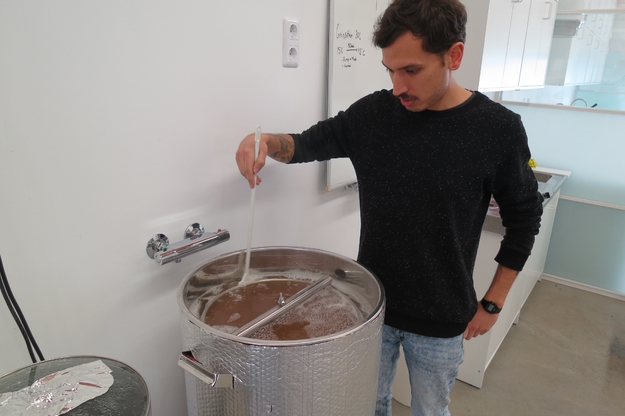Myco Insuation Brewery
Why throw away spent grain from brewing beer when it could become food (substrate) for eco-friendly mycelium insulation panels?
This is the essence of the Myco Insulation Brewery project. At Mediamatic, we have been altering the standard process of beer brewing in order for the waste (barley grain) to be re-used as growing material for mycelium insulation panels for the Sluisdeurenloods.
Previously, the panels were being created as part of an exhibition inside the barn, but the unsuitability of the space halted the project. The refurbished Clean Lab has now enabled the program to reboot. The refurbished space provides two equal spaces - one for the beer brewing (the fermentation kitchen), and one for the mycelium cultivation (the clean room).
The brewing process, through to the mycelium cultivation is a continuous day-long process with brewing starting in the morning and grain inoculation in the afternoon. This new space allows for real team work and for production to flow easily from one phase to the next. If one aspect fails then the whole day of brewing and cultivation fails and the new Clean Lab minimises the chances of failure.

Beer Brewing
Production of a tasty beer took a back seat to mycelium cultivation previously, resulting in poor quality beers. It is now the goal of the current team to produce a great tasting beer, unique to Mediamatic, of an equal quality to the mycelium panels.
The beer is currently in its experimental phases of production, with a recipe being trialled every week, each with slight tweaks. Approximately 50 litres is brewed each time. So far there have been 3 brews, with changes made to yeast and fermentation temperatures. The brew team are so far using a simple SMASH recipe (single malt and single hop) in order to try to establish the different characters they are able to create.
The team are using a modified brewing process for the beer as they are boiling the grains in a method of pasteurisation rather than removing them after the mashing process (as is normal practice). The reason for boiling the grains is so that there are less bacteria / micro organisms when they are inoculated with mycelium spawn.
Work in Progress
The brew team is currently still working on creating a temperature controlled fermentation chamber. Keeping a constant fermentation temperature is vital because if other variables are changed for each brew, such as yeast quantities, results with not be constant and reliable.
The first tastings will be in 2 or 3 weeks so watch this space!

Mycelium Cultivation
One constant is that the spent beer grains are still being used! After the grains have been removed from the brewing process, they are dried with a centrifuge machine to spin out the remaining moisture. This is a new process as watery substrate was a key element of failure before. The grains are then sterilised using a pressure cooker, which heats them to 121°C to get rid of any remaining organisms. The substrate is then innoculated with mycelium spawn and incubated for up to four weeks to create an insulation panel.
When the panels are fully grown, they are sterilised to stop mushroom growth. The panels are not only heat resistant, but also fire-resistant.
Work in Progress
As with the brew team, the mycelium cultivation team still have progress to make and experiments to carry out. At present, the team is developing better incubators to provide an optimal growing environment for the mycelium.


